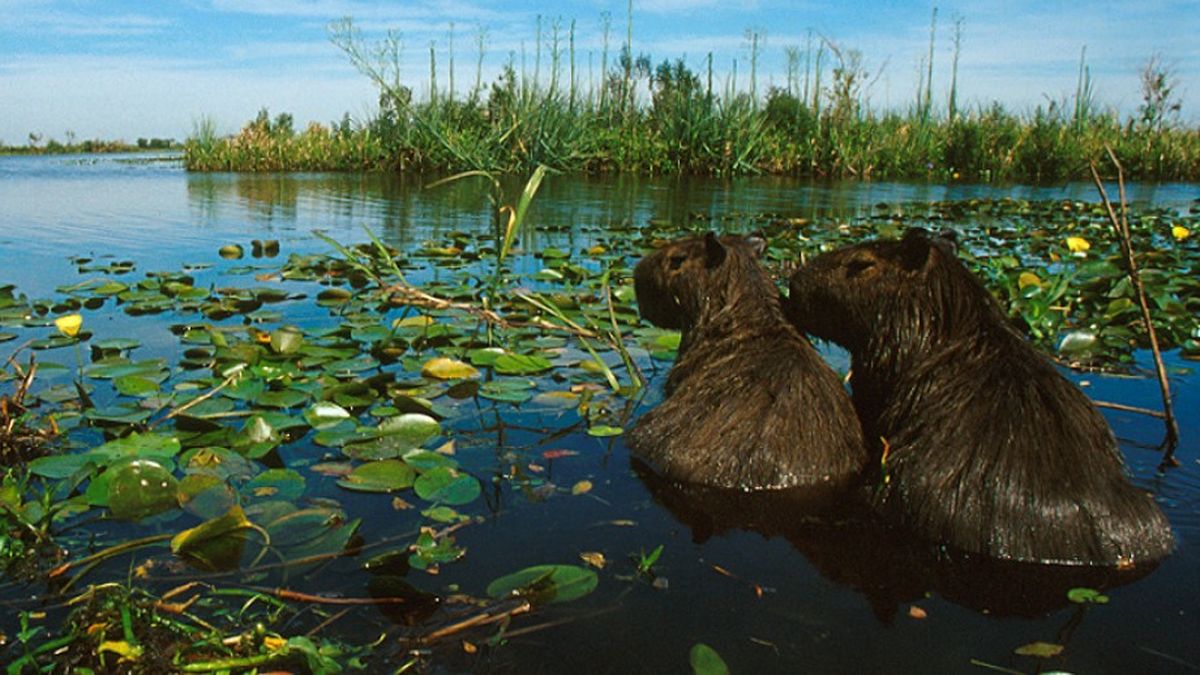There are wetlands throughout the national territory that have been deteriorating due to the uncontrolled advance of soybean, mining and real estate extractivism.
The main causes of degradation and vulnerability are burning for the expansion of the industrial agricultural frontier, the use of agrochemicals, contamination with toxic substances from mining activity, real estate cementation, overexploitation of natural resources, invasive species and the disposal of poorly treated waste.
Wetlands are transition zones between terrestrial ecosystems and aquatic ecosystems. The RAMSAR Convention, an international convention with the aim of ensuring the protection of wetlands, defines a wetland as an area of the earth’s surface that is temporarily or permanently flooded, regulated by climatic factors and in constant interrelation with the living beings that inhabit it. .
Wetlands are part of the natural systems that make life possible on Earth. 40% of the world’s biodiversity lives or reproduces in them. They are large purifying filters and freshwater reservoirs. They buffer the impacts of rain and store more carbon than any other ecosystem -even more than forests-, which is why they are great allies in the fight against climate change. They are also linked to various cultures and traditions.
Nevertheless, it is estimated that in the last 300 years 87% of the planet’s wetlands have disappeared and there is little awareness of their importance for life. In Latin America and the Caribbean, since the 1970s, 58% have disappeared. In Argentina there are more than 600,000 km² of wetlands (21.5% of the surface) and among them there are 22 Ramsar sites that, in total, reach some 5.6 million hectares. We have a great diversity of wetlands in urban and rural areas. In the northeast of the country there are more wetlands than in arid regions, but in all cases they play an essential role. They include: high Andean lagoons, marshes, peat bogs, floodable grasslands, estuaries, marshes, lagoons and marshes.
Between the mid-1990s and 2012, 40% of the wetlands were lost in what is known as the Lower Delta. Was it necessary to reach this point of fires in the Paraná Delta? Why the inaction or ineffectiveness of the governments of Entre Ríos, Santa Fe, Buenos Aires and the Nation to implement urgent actions to reverse this tragic scenario?
In the last three years, fires throughout the region have increased dramatically without adequate government reaction. Between 2020 and 2021, in the context of the prolonged extraordinary drop in the Paraná and the worsening of the drought, more than 700,000 hectares of the Paraná Delta and islands were burned. In 2022, until August 21, 196,073 hectares of that territory have already been burned.
Since 2020, environmental organizations have repeatedly requested governments to urgently implement the Comprehensive Strategic Plan for the Conservation and Sustainable Use of the Paraná Delta (PIECAS-DP), with a community approach and social participation, which would make it possible to reach short-term multisectoral agreements to stop the burning. Until now, the authorities have concentrated mainly on fighting the fire, carrying out inspections, legal complaints, prevention, prohibiting burning, and installing an early warning system. However, the process of social participation with a view to implementing the actions of the Plan has not been carried out so far..
We are concerned that actions that address the underlying issue, which is the use of fire in the activities that take place in the Delta wetlands, are still not immediately prioritized and executed. The continuity of the fires shows that prohibitions and judicial decisions are of little use if there is no presence in the territory with a sustained and committed work that addresses the problem between the different sectors involved. After almost fifteen years since the creation of the PIECAS-DP, it is time to act effectively, recover the experiences and agreements reached between the different jurisdictions and various social sectors, and immediately advance in the environmental management of the Delta.
In this context of fires and climate and ecological crisis, we call on the provincial and national environmental authorities to dialogue, articulate and coordinate to advance in the participatory implementation of the Plan in order to make productive activities compatible with the maintenance of integrity. ecology of the wetlands and the needs of the communities that live in the Paraná Delta.
to prevent fires The prompt sanction of a Wetlands Law is also essential, but not just any law.
We need the sanction of the text agreed by specialists, scientists and civil society organizations through an open, transparent, collective, inter-institutional and multisectoral process, which was promoted in 2020 by the Natural Resources Commission of the Chamber of Deputies, and that it brings the institutional scaffolding, definitions and tools necessary to effectively address and reverse the emergency that the wetlands of our country are going through, which is currently under analysis by the Chamber of Deputies File 0075-D-2022.
We need the National Congress to be up to the ecological and climate crisis that we are going through, and that the citizen claim of more than a decade behind the project be recognized.
Without law there is no wetland protection policy. For the common good, present and future generations, we demand a #WetlandsNow Law.
Doctor of Law. Specialist in Environmental Law. President of the Citizen Association for Human Rights. Member of the Network of Defenders of the Environment and Good Living
Source: Ambito




